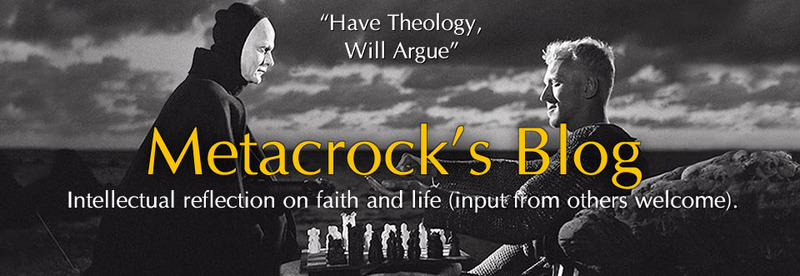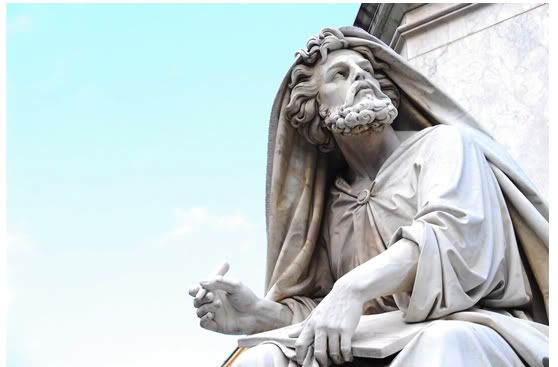Inerrancy and Inspiration
The model used by evangelicals and fundamentalists, often called "inerrancy," (officially the "verbal Plenary Inspiration") is sort of based upon the business model. It assumes that the Bible is propositional truth, the statements in it are propositions in that they are either true or false statements and can be defended as such by rational argument. Verbal Plenary because all the verbiage is inspired, thus the opposition to the distinction. This view is usually justified by appeal to scripture itself, this is taking it at is word what it claims for itself, as Slick states:
First of all,["contains" rather than is word] this doesn't fit what the Bible says about itself. The collection of 66 books that the Christian Church recognized as being inspired speaks as the very words of God in many places.First of all speaking "as the words of God in many places" could be construed as containingrather than being the word of God. It doesn't speak that way in every single sentence. There is no conscious awareness expressed by any work within the canon that there is a canon. The books themselves don't know that they are one of 66 books in a collection deemed "the word of God." There is no reference in the Bible to the Bible. Now the conservatives assert that when we find references to scripture that this is synonymous but it's not. We don't know what scripture means for each writer who uses the term. When Jesus refers to scripture does he mean the same set of books that Paul meant when he refereed to it? If so there is no such place where it says this. When Paul said "all scripture is inspired" (2 Tim 3:16) (literally "God-breathed") the canon of even the OT was not closed, We don't know what he meant by scripture. He could have included books we don't know about, he surely did not mean his own or any other written in "NT era." He was not thinking of letters to Churches by major Christians as scripture,
Of course, the errantists (those who say the Bible in its original documents had errors) will reject these scriptures' accuracy; that is, they will deny that God's word is without error -- even in the originals.[2]
- "Thus says the Lord" occurs over 400 times in the Old Testament.
- "God said" occurs 42 times in the Old Testament and four times in the New Testament.
- "God spoke" occurs 9 times in the Old Testament and 3 times in the New Testament.
- "The Spirit of the Lord spoke" through people in 2 Sam. 23:2; 1 Kings 22:24; 2 Chron. 20:14.
In terms of the three instances above where it says "thus says the Lord" what follows that phrase might be the words of God, that doesn't mean that what preceded it would be. In many cases the OT says "the word of the Lord came to him saying." So what is repeated that came to him (whomever) would be the word but that doesn't make things said before that the word. It says God says 42 times how many more times do others speak in the Bible and they are not God? Are the things they say also the word of God? He lists three times where the Spirit of God spoke through people, so those would be words of God but does that mean that all the other times are then not the word of God?
Hate to keep harping on Slick but he's so convenient:
Of course, the errantists (those who say the Bible in its original documents had errors) will reject these scriptures' accuracy; that is, they will deny that God's word is without error -- even in the originals.Jesus doesn't speak about what is written about him in the "Old Testament." They didn't have one then. No passage in the Bible is aware of itself as "the Bible." When Paul wrote that all scripture is inspired (as I said above) the canon of the old testament was not closed, We don't know what works he meant, although it is a safe bet he would have included the Torah. Equally safe he would not have been thinking of his own letters to churches,
If appealing to the Bible in a general sense isn't good enough. Let's consider that Jesus said the Law, the Prophets, and the Psalms (all of the Old Testament) were Scripture and that the Scriptures cannot be broken, cannot fail (John 10:35).Some might say that there are instances of verses that "contain" God's word, but that it doesn't mean the Bible is God's word. The problem is addressed by Jesus.
Luke 24:44-45, "Now He said to them, 'These are My words which I spoke to you while I was still with you, that all things which are written about Me in the Law of Moses and the Prophets and the Psalms must be fulfilled.' 45 Then He opened their minds to understand the Scriptures. "Notice that Jesus speaks about what is written regarding him in the Old Testament. Then Luke writes that Jesus opened their mind to understand the Scriptures. What Scriptures? The Law (Moses), the Prophets, and the Psalms. This was a common designation for the Old Testament. Therefore, Jesus says that the written form of the Old Testament is Scripture. Jesus goes on to deal with the religious leaders who would violate these Scriptures which he called "the word of God."[3]
Inerrancy as a doctrine was made to combat evolution. That's why it's based upon literalism,so we can insist the days are not ages. Verbal plenary Inspiration has only existed as a doctrine since the 19th century or so. The church fathers don't use that term and never voice the kind of concerns the innerrantists voice. Here's a concept I learned about in seminary and it was a mind blower to med at the time: the Bible is not the word of God, Jesus is. Everyone knows this but fundamentalists will distinguish between the living word and written word and go on talking about the Bible that way. But the Bible dopes not make that distinction. In fact when the OT says "the word of the Lord came to him saying" it could just as easily really be saying Jesus the actual word of God came to him and said whatever,
The concept of inspiration that I accept is called "dialectical retrieval.," it's based upon Barth, Niebuhr, and others who thought there is a dialectical relationship between the reader and the text. We must assume we dealing with the word of god,k even though Bible is just the written record but in our reading of that record the word of God (the Spirit) will show us what we need to see. It's like the assumptions we made with stop signs, We don't stop at them only early for pragmatic reasons, There are some signs cars never go by, We stop at them because it's the law. There is no law that says the Bible is the word of God but we know that the Biblical texts are written out of the same process of Spirit-driven insight in which we read the test, Thus it pays us to not look legalistically but seriously at the text and to be open to the insights to which the Spirit of God would lead us.
I have an essauy that deals with five different concepts of imerrancy and several different models of revelation or inspiration. It's too long for a blog it's on my apologetic site The Religious A Priori.[4] It's based upon Avery Dullle's exceent book Models of Revelation.I recompensed that book Highly,[5] Please read my Essay.
My position is this: The list of canon is a man made institution but it was drawn up with the aid of the Holy Spirit, The Bible is not the word of God but it is a written record of some words the Word has "spoken" to humans though other humans in divine-human encounter. We accept the canon as the judgement of the Church but we know the inspiration is in there and the Holy Spirit will show it to us in dialectical encounter between reader and Text. IOW: read the Bible. Use historical critical methods and think logically,
The point here apologetically speaking is that most atheist Bible problems are based upon the assumption of extreme fundamentalism and extreme literalism. Most of what they say can be dismissed by impelling them what I've said here, I';ve doing tit for years.,
Sources
[1] Matt Slick, "the Bible isn't the Word of God. It Contains the Word of God." CARM. Webpage:
http://carm.org/bible-isnt-word-god-it-contains-word-god
[2] Ibid
[3] Ibid
[4] Joseph Hinman, "The Nature of Biblical Revelation," Religious A Priori on line
http://religiousapriorijesus-bible.blogspot.com/2010/07/nature-of-biblical-revelation.html (accessed 8/1/16
[5] Avery Dulles, Models of Revelation. Maryknoll New York: Orbis Books; 2nd ed. edition September 1, 1992.
Dulles id a Cardinal in Catholic chruch, made so by JPII, His father was secretary of state under Eisenhower, John Foster Dulles.
different notions of inerrancy Dulles Discusses:
*Inerrency of original autographs and divine protection of manuscripts.
Proponents of this view include Harold Lindsell.
*Inspiration of autographs with minor mistakes in transmission of an unessential kind.
Carl C.F. Henry.
*Inerrency of Textual intention without textual specifics.
Clark Pinnock.
*Inerrancy in Soteric (salvation) knowledge but not in historical or scientific matters.
Bernard Ramm
*Inerrent in major theological assertions but not in religion or morality.
Donald Blosche and Paul K. Jewett
As you can see inerrancy is far from settled. There are several concepts of revelation in addition to dialectical:
Revelation as History
as Inner experience
as Doctrine
as Dialectical presence



